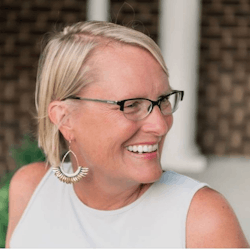Transforming dentistry's discussion on mental wellness: From awareness to action
Individuals and organizations around the globe are raising awareness about the current mental health crisis. And it’s definitely a crisis. More than 300 million people worldwide deal with depression, making it the leading cause of disability.1 Every 40 seconds, a life is lost to suicide.2 As The Guardian put it in a headline last year, “World in mental health crisis of ‘monumental suffering,’ say experts.”3
It's distressing for us as clinicians and caregivers to feel paralyzed and powerless when a problem is so immense and overwhelming; after all, we are in the business of fixing and making things better. That’s why moving from general big-picture understanding to actionable measures that encourage mental well-being is the best use of this moment in time. And people want and need support to take action: 91% of Americans say their emotional well-being has been hurt by ignoring or not recognizing warning signs that they’re overstressed.4
The goal is to assist dentistry professionals in recognizing the warning signs of mental health issues, obtaining the support they need, making the necessary improvements, and living the life they deserve, not merely the life they settle for.
Beyond destigmatization
Talking about destigmatization is noble. But action starts with truly understanding mental health issues and the brain’s role. Today we know that the human brain is not static, but instead has a remarkable lifelong potential to effect adjustments. The brain is miraculous; 100 billion neurons firing and wiring together, forming the circuits that support thoughts, emotions, and behaviors. Although neuroscience might be confusing and even overwhelming, it is essential to note one thing: we each have the power to change our own brain.
The good news is that, with this move, we are now set for a shift. Years of programs have brought the topic of mental health from the periphery to the mainstream. (For example, since 1949, May has been Mental Health Month.) Schools are learning about mental health. Police forces are speaking about it. More and more influential individuals are chipping away at the stigma, from pop stars and politicians to pro athletes and members of the British royal family, by sharing their own experiences and hardships. It’s time dentistry follows suit. Our need is great but resources few.
Creating platforms and safe spaces—such as the Dental Mental Network—that dental professionals and family members can turn to without the fear of being ostracized, is an essential element in moving the needle. Unveiling the struggle behind our masks in a supportive environment and having immediate access to skilled mental wellness professionals is only the beginning. There is still much work to be done in the stigma eradication arena, and it starts with us having the fundamental human decency to be present for others and listen actively. We all have a basic need to be heard and understood.
So, what does it mean to transition from awareness to action?
What can all of us realistically do amid this global crisis? Science holds the answer. Stanford Medicine researchers are revolutionizing how we perceive stress, encouraging us to take constructive action in our daily lives to manage the effects. Dr. Leanne Williams, Director of Stanford's Precision Mental Health and Wellness Center has used high-definition brain imaging technology to describe eight types of “short circuits” that occur in the brain when we experience continuous negative stress that we don't think we can handle.5 Understanding the emotions, thoughts, and patterns associated with each biotype will contribute to an understanding of the times and situations in which we suffer most and what actions will assist with depression or anxiety.
One way this power manifests is in the way we respond to stress. Stress is a massive part of life, and it shapes how the brain changes and adapts, for good and for bad. At this moment in time, dentistry is facing a mental wellness crisis of historic proportions. We are frightened, exhausted, lost, and stressed like never before. When we're stressed because we can't control our situation, negative thoughts and emotions take hold. Stress is not bad in and of itself, and certain kinds of stress are okay, like stress linked to an ambitious project that’s important to you. But when negative stress becomes cumulative, in the parts of the brain responsible for thoughts and feelings, we can experience a "short circuit" and become trapped in a loop. These short circuits are not a form of weakness or a personality flaw, they communicate with our experience through biology. And at some stage, everybody experiences them.
Constant strain can be placed on your brain circuits when you have persistent negative stress you don't believe you can handle. Your brain circuits will become more and more stressed if you can't find a way to adjust to the stress and ultimately get trapped. We call clinical depression or clinical anxiety disorder effectively the state of being trapped and feeling like there is no way out or no way to think about it. It can be challenging to be effective under such circumstances.
What we provide our brains matters
Everyone has a way of reacting to negative stress that is their own. Bio-individuality plays just as much of a role here as anywhere else. Remember, mental health is precisely like every other aspect of health, and we need to consider what our brains need us to provide, just as we think about what foods we feed our bodies. What data do we send it, what do we concentrate on, how do we train it, and how do we pursue constructive stress that helps us develop resilience and learn negative stress management strategies?
My intuition is, the better you understand the answers to these questions and your brain in general, the more prepared you will be.
References
- GBD 2017 Disease and Injury Incidence and Prevalence Collaborators. Global, regional, and national incidence, prevalence, and years lived with disability for 354 diseases and injuries for 195 countries and territories, 1990-2017: a systematic analysis for the Global Burden of Disease Study 2017 [published correction appears in Lancet. 2019 Jun 22;393(10190):e44]. Lancet. 2018;392(10159):1789-1858. doi:10.1016/S0140-6736(18)32279-7
- World Mental Health Day 2019 - Focus on Suicide Prevention. World Health Organization. October 10, 2019. www.who.int/news-room/events/detail/2019/10/10/default-calendar/world-mental-health-day-2019-focus-on-suicide-prevention
- World in mental health crisis of ‘monumental suffering,’ say experts. The Guardian. October 9, 2018. www.theguardian.com/society/2018/oct/09/world-mental-health-crisis-monumental-suffering-say-experts
- Khidekel M. The COVID-19 pandemic has made spotting our mental health warning signs more critical than ever. Thrive Global. May 1, 2020. https://thriveglobal.com/stories/mental-health-learn-to-spot-recognize-stress-warning-signs-microsteps/?utm_source=Recirc
- Williams L. This new brain science could help you unlock better mental health. Thrive Global. October 10, 2019. thriveglobal.com/stories/mental-health-biotypes-brain-science-leanne-williams-research-signs-stress/
About the Author

Sue Jeffries, BSDH, RDH
Sue Jeffries, BSDH, RDH, began her dentistry career in 1983 when she joined the United States Navy as a dental technician. During her 20-year Naval career, she assisted in all dentistry phases, managed several Naval Dental Centers, and completed her hygiene degree. Upon retiring, Jeffries began practicing dental hygiene full-time and continues to practice as a guest hygienist. In 2018, she completed a Bachelor of Science degree in Oral Health Promotion at O'Hehir University under the tutelage of Trisha O'Hehir. Her true passion lies in advocating for mental health awareness and eradicating its stigma. As cofounder of the Dental Mental Network, a 501c3 charitable organization serving dentistry, Jeffries works tirelessly toward that end.
Updated December 2, 2020

